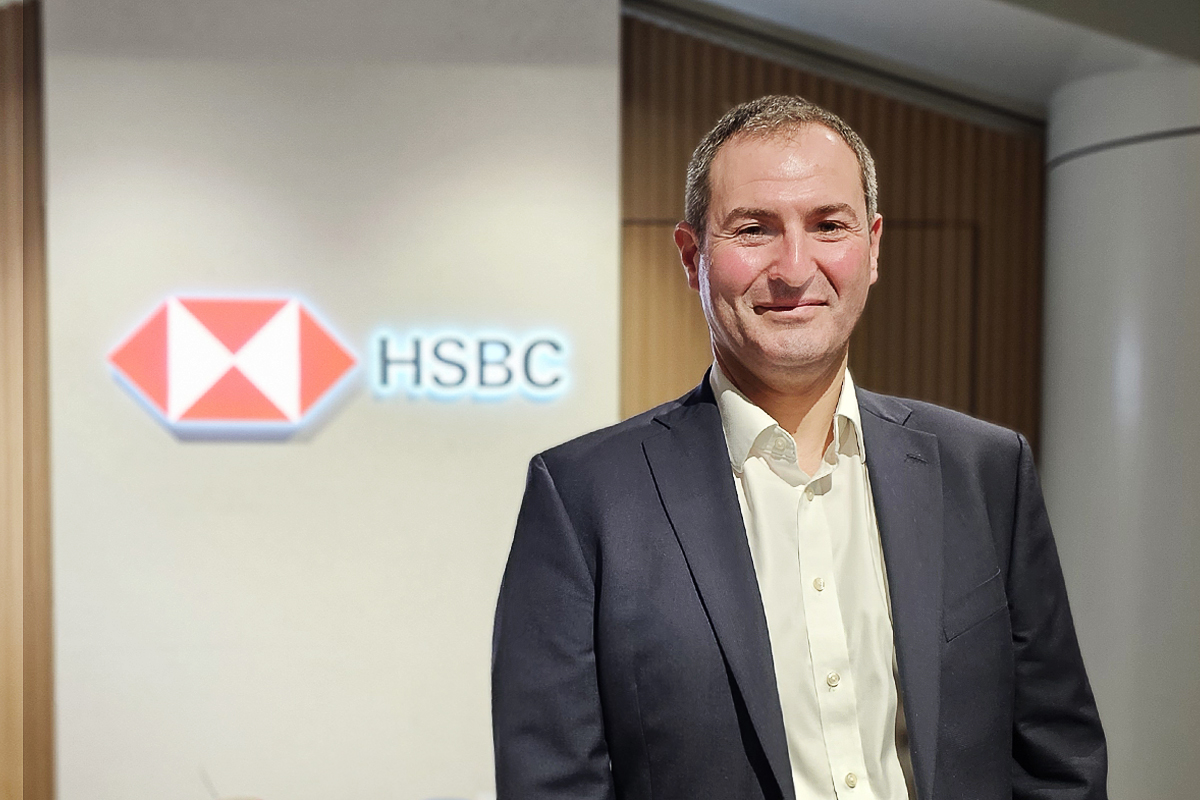Investors are increasing allocations towards the private credit asset class, favouring the short-duration nature of the investments and the risk/reward trade-off. In the current macro environment, the benefits of private credit investments have come to the fore. Increasingly, traditional institutional investors are joined by ultra-high-net-worth individuals and family offices, which have also been attracted to this asset class.
“We're at an inflection point because a lot of the focus in recent years has been on higher-return, higher-risk asset classes, such as private equity and venture capital. The returns these asset classes have delivered in the past are becoming increasingly difficult to repeat,” shares Scott McClurg, head of private credit, alternatives, at HSBC Asset Management (HSBC AM). “So, there's an increasing appetite for a more balanced risk-adjusted return. This is where private credit can play a part, allowing investors to benefit from the opportunity to access strong credit quality, delivering attractive returns.”

Scott McClurg, head of private credit, alternatives, at HSBC Asset Management.
The asset class evolved quickly after the global financial crisis and has increased in size significantly in the period since then. In Preqin’s most recent investor survey (November 2022), 44% of respondents suggested they would increase their allocations to the asset class – up from 37% in November 2021. These increased allocations are expected to boost growth in private credit assets under management (AUM), from US$1.2 trillion at the end of 2021 to US$2.3 trillion at the end of 2027 – a compound annual growth rate of 10.8% per year.
The Asia-Pacific market is still relatively immature, compared to North America and Europe. This provides significant opportunity for HSBC to leverage its leading position within the region.
The intrinsic features of private credit are increasingly well-known to investors. To name just a few: illiquidity premiums; low mark-to-market volatility, which is enhanced by floating rate with floors; seniority in the capital structure, with downside protection via covenants, equity cushion, and manager influence over loan structuring; secure cashflows and yields over the medium to long term, making it suitable for a wide range of investors.
HSBC AM’s distinction is being able to serve clients across the HSBC Group’s businesses. “We are looking at how we can support our customers and help their businesses to grow and to thrive. A lot of that comes down to how we can help them access capital in the most efficient way”, he notes.
“As APAC-based businesses look to internationalise – whether that's within Asia or towards more global opportunities – that becomes increasingly difficult for local banks. The strength of our proposition comes from asset management working very closely with the bank, and how we support our customers and clients to achieve their ambitions,” McClurg explains.
“Traditionally, the banking sector can be constrained around either single-party or counterparty risk. So, how do we help the bank provide solutions to clients? How can we help them access what they need to be able to grow and build their business in the right way?
“What we're looking to do is unlock that opportunity for Asian investors to be able to support Asian businesses, and that's a driver that's coming from our [local] investor base. We want to be able to deploy locally,” he says. That means deploying Hong Kong dollars to support Hong Kong enterprises or Thai baht to benefit Thai businesses.
For HSBC AM, its unique value proposition is its access to borrowers originated by the bank. “We get involved with the borrower and help structure the transaction, and we provide the funding directly to the borrower. We're doing that on an individual, transaction-by-transaction basis. And we continue to develop that alongside the bank,” McClurg notes.
While HSBC AM’s private credit team makes its own decisions and works independently from the bank, quite a lot of what it does has a bank relationship as well. And there lies its competitive advantage: the ability to leverage the well-established local presence.
Partnership with the bank
McClurg regards his team’s linkage with the bank as the key differentiator: “If you look at our experience in the UK, leveraged buyout deal volumes were significantly lower in 2022 than in 2021, but we had a record year in terms of deal activity thanks to our partnership with the bank.”
The focus is on lower, mid-market transactions, ideally with a ticket size of about US$50 million. These usually involve companies that have no access to large-cap financial products available in the market.
“A lot of the private credit activity is focused on larger opportunities, and it's crowded in that part of the market. But for us, there is a large part of the market that is not well served,” McClurg says.
“Because most of our competitors are raising large funds, they have to deploy across a relatively small number of large transactions. These are generally very visible, competitive deals and many market participants are aware of them. But what we’re looking for are high-growth opportunities with entrepreneurial business owners. These people are building businesses to grow not just in their own country but globally. There’s a lot of technology, a lot of expertise, a lot of knowledge that we can support to grow and that can be exported as well.”
He stresses, however, that “we're looking at supporting high-growth, proven businesses, so we're not venture capital investors”.
Infrastructure debt can support the move towards net zero
While it is often a different investment proposition, infrastructure debt is being increasingly targeted by investors looking for fixed-rate products to match their long-duration liabilities. Similarly, in its floating-rate format, infrastructure debt is attractive to those seeking a hedge against rising rates.
McClurg sees enormous opportunities in the infrastructure sector, driven by the move away from traditional fossil fuels as a source of energy generation.
“On the one side, you've got the growing prevalence of renewable energy, and on the other, you've got the decline of fossil fuel energy providers over the long-term. Many organisations continue to avoid coal-fired power stations, for example, which are increasingly off-limits” he notes.
“Renewable energy assets, storage and networks are able to deliver a solid return in the medium to long term for our investors, and that’s what they're looking for.”
At the same time, infrastructure investment can fit with investors’ environmental, social and governance (ESG) strategies. In the case of transition from coal, for example, “many investors would no longer be able to support those kinds of transactions because they are incompatible with public commitments towards future net zero targets,” McClurg says. Investment in the provision of renewable energy is in line with HSBC AM’s commitment to mobilize financing towards achieving net zero.
In this regard, the private credit team leverages the bank’s expertise on the ground to unlock the pockets of opportunities as countries transition to a low-carbon economy.
“We’ve got over 200,000 people globally who are looking at how we can find a way to do this,” McClurg says. “And, therefore, we are leveraging that in a way which allows even our biggest investors, which don’t have that footprint, to unlock those opportunities. The HSBC Group is very actively involved and working with many major institutions, with local authorities, looking at how to accelerate some of that transition from a much more countrywide, strategic level.”
Strong cash flows and a fair return
What is important for investors are the strong cash flows and that they get a fair return, which is typically higher than equivalent fixed income investments; the goal is to materially outperform a benchmark of similar fixed-income investments.
McClurg is upbeat on the outlook of private credit. “The media headlines would have you believe that the world is facing plenty of hurdles, and we do not ignore the risks, but on the ground what many businesses see are significant opportunities, and our role is to provide the capital our customers need and help our clients meet their investment objectives,” he says.
Learn more about HSBC Alternative investments:
Alternative investments - HSBC Asset Management Hong Kong
For Professional Clients only and should not be distributed to or relied upon by Retail Clients.
HSBC Asset Management is a group of companies in many countries and territories throughout the world that are engaged in investment advisory and fund management activities, which are ultimately owned by HSBC Holdings Plc. HSBC Asset Management is the brand name for the asset management business of the HSBC Group.
Investors in alternatives products should bear in mind that these products can be highly speculative and may not be suitable for all clients. Investors should ensure they understand the features of the products and fund strategies and the risks involved before deciding whether or not to invest in such products. Such investments are generally intended for investors who are willing to bear the risks associated with such investments, which can include: loss of all or a substantial portion of the investment, lack of liquidity in that there may be no secondary market for the fund and none may be expected to develop; volatility of returns; prohibitions and/or material restrictions on transferring interests in the fund; absence of information regarding valuations and pricing; delays in tax reporting; key man and adviser risk; limited or no transparency to underlying investments; limited or no regulatory oversight and less regulation and higher fees than mutual funds.
Please note that alternatives related investments are generally illiquid, long term investments that do not display the liquid or transparency characteristics often found in other investments (e.g. listed securities). It can take time for money to be invested and for investments to produce returns after initial losses. As such alternatives related investments should be considered as a very high risk investment and are only suitable as part of a diversified portfolio. Before making such investments, prospective investors should carefully consider the risks set forth in the relevant investment documents.
The contents of this document have not been reviewed by SFC or any regulatory authority in Hong Kong. You are advised to exercise caution in relation to the offer. If you are in any doubt about the contents of the relevant investment documents you should consult your accountant, legal or professional adviser or financial adviser. The Product is not authorized under Section 104 of the Securities and Futures Ordinance of Hong Kong by the Securities and Futures Commission of Hong Kong. Accordingly, the distribution of this Private Placement Memorandum, and the placement of interests or units in Hong Kong, is restricted. This Private Placement Memorandum may only be distributed, circulated or issued to persons who are professional investors under the Securities and Futures Ordinance and any rules made under that Ordinance or as otherwise permitted by the Securities and Futures Ordinance.
HSBC Asset Management is the brand name for the asset management business of HSBC Group. The above communication is distributed in Hong Kong by HSBC Global Asset Management (Hong Kong) Limited.
No part of this publication may be reproduced, stored in a retrieval system, or transmitted, on any form or by any means electronic, mechanical, photocopying, recording, or otherwise, without the prior written permission of HSBC Global Asset Management (Hong Kong) Limited.









